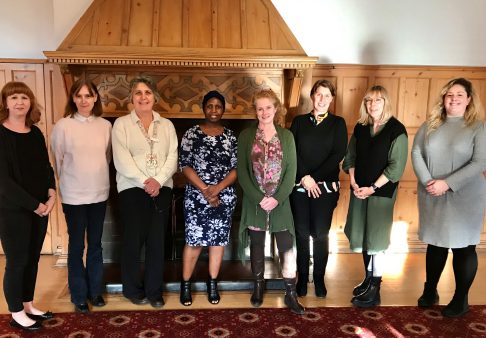Our Nurses, Midwives and Allied Healthcare Professionals (NMAHP)
28 March 2023
The Nurses, Midwives and Allied Healthcare Professionals (NMAHP) are an established group within the Centre for Trials Research (CTR), who contribute clinical and research expertise to a wide range of studies, including leading the implementation and delivery of studies. NMAHP use their clinical expertise to inform optimal trial processes extending from eligibility and recruitment to delivering interventions, data collection, managing safety, and contributing to the interpretation of results.
The NMAHP group is made up of clinicians with experience in service delivery within different clinical settings within the NHS. The NMAHP breadth of expertise includes co-designing interventions, developing proposals, leading the implementation and delivery of studies, developing and leading new areas of research, through to conducting public engagement activities. A common thread is keeping the experiences of patients and the public at the heart of all we do.
There have been a number of studies where a member of the NMAHP group has had a key role in the success of the trial. Examples include establishing a study in a clinical area involving a complex set-up, where having a clinician as part of the delivery team ensured that the study remained a priority in a busy clinical environment and the study was embedded into the patient pathway.
Other examples include studies in which the intervention is complex and having a trained experienced clinician to help support the research team in the training and delivery helped reduce errors and ensured a high standard of care and treatment was delivered safely to patients included in the study.
The Health Care professionals in the NMAHP group at CTR are trained and experienced in taking informed consent and supporting patients and families through both physically and challenging situations. When complex screening, identification and consent procedures are involved e.g., population including people who may lack capacity, having knowledge and understanding of the rights of the participant allows people who otherwise may have been excluded the opportunity to take part in research. An article by Shepherd and Davies (2020 ) discuss the challenges of conducting research in care home settings and how sharing experiences and knowledge to the wider research communities and practices can help with future research studies. It also gives staff working in health care settings e.g. nursing and care home the confidence, knowledge and skills to take part in research activities. Taking part in research activities has a huge impact on feeling valued and helping towards improvements in health and social care for both participants and staff.
Supporting other health care professionals within the speciality of research is an important part of the role along with offering as many people the opportunity to take part in research either as participants or as public representatives.
Shepherd, Victoria and Davies, Jane 2020. Conducting a randomized controlled trial in care homes: the challenges of recruiting residents who lack capacity to consent. SAGE Research Methods Cases: Medicine and Health, SAGE, (10.4135/9781529726626)
- December 2025
- October 2025
- June 2025
- May 2025
- April 2025
- March 2025
- February 2025
- December 2024
- November 2024
- October 2024
- September 2024
- July 2024
- June 2024
- May 2024
- April 2024
- March 2024
- December 2023
- November 2023
- September 2023
- July 2023
- June 2023
- April 2023
- March 2023
- February 2023
- December 2022
- November 2022
- October 2022
- September 2022
- August 2022
- July 2022
- June 2022
- May 2022
- April 2022
- March 2022
- February 2022
- January 2022
- November 2021
- September 2021
- July 2021
- June 2021
- May 2021
- March 2021
- February 2021
- December 2020
- November 2020
- September 2020
- August 2020
- July 2020
- January 2020
- December 2019
- October 2019
- September 2019
- July 2019
- June 2019
- May 2019
- April 2019
- February 2019
- December 2018
- November 2018
- October 2018
- September 2018
- August 2018
- July 2018
- June 2018
- May 2018
- April 2018
- March 2018
- December 2017
- October 2017
- August 2017
- July 2017
- June 2017
- May 2017
- April 2017
- March 2017
- February 2017
- January 2017
- December 2016
- October 2016
- August 2016
- June 2016
- April 2016
- March 2016
- February 2016